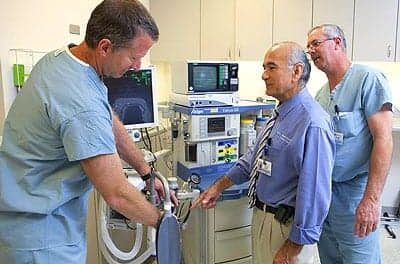By Larry Fennigkoh, PhD, CCE
Dr. Joie Marhefka’s recent article for 24×7—“Traits of a Successful Biomed Student”—was spot on and offers a great list of not only thought challenges for those contemplating a career as a BMET or CE, but also an additional rubric for HTM hiring managers when assessing prospective new hires. Dr. Marhefka cites seven traits to look for:
- An aptitude for “tinkering”
- A passion for computer skills
- Good communication skills
- Good teamwork skills
- Creativity
- Adaptability
- An interest in healthcare
Many of our seasoned HTM professionals, I would offer, also share these same characteristics which are, in part, precisely what makes us such an asset to healthcare. As such, continuing education and professional development efforts that nurture and further develop these traits should be encouraged. However, I would place an additional trait on this list: empathy—an ability to understand, share, or be aware of the feelings of others.
Especially within the hospital workplace, we are likely to encounter human emotions at their most extreme. These feelings can include the panic, frustration, helplessness, or downright rage from our equipment-user caregivers when their essential technology goes awry. They can include the wide-eyed worries from patients when their monitor or IV pump goes into alarm. It can be the surgeon who goes ballistic because the electrosurgical unit doesn’t cut as expected.
The BMET or CE who can truly empathize with these caregivers and patients possesses yet another powerful and precious emotional skill set. Being able to literally “feel” and appreciate the incredible dependency these people have on our technology will continuously motivate us to treat and respond to each service call as though our own mother, father, wife, or child is connected to that monitor or IV pump. A sense of empathy will also provide some perspective and self-comfort after responding to a stat service call only to get cussed out upon arrival— instead of a relieved “Wow, thanks for getting here so quickly.”
A display of genuine empathy is also one of the best ways to quickly diffuse an understandably angry and frustrated caregiver. Since many caregivers are somewhat naturally empathetic themselves, they may immediately “feel” your genuine concerns and deescalate as well. Simply arriving with an attitude of “This must be really scary and frustrating for her” instead of “Idiot, why can’t they figure this out themselves?” can alter the encounter tremendously.
Many of the HTM-related staff complaints I used to receive were rarely due to issues of technical competency or speed of response but rather of a perceived lack of concern, of not “getting it.” Simply put, it was a perceived lack of empathy.
Some of us may be more naturally empathetic than others, but empathy can be taught and learned. According to Helen Riess, MD (associate professor of psychiatry at Harvard Medical School and director of the Empathy and Relational Science Program at Massachusetts General Hospital as well as co-founder and chief scientist of empathetics.com), empathy is not just a “soft” skill but rather a “neurobiological-based competency” that can not only be strengthened and enhanced but one that also elicits measureable autonomic nervous system responses. Dr. Riess has a particularly good Ted Talk— “The Power of Empathy”—in which she describes some of this research and techniques for enhancing empathy.
Last, and for the predominately “thing-oriented” HTM professional working in a predominately “people-oriented” environment, empathy is that common emotional and connecting denominator that when regularly and naturally practiced nurtures trust and builds collaboration. The renewed and deepened relationships that result will make you love and appreciate your job and role that much more. There’s a common adage that rings true here: “People will forget what you said, people will forget what you did, but people will never forget how you made them feel.”
When our healthcare providers know that you really care—really feel—you’ll have a partner and colleague for life, and you’ll be embraced for the tech rock star that you are.
References:
- Riess H. The Science of Empathy. Journal of Patient Experience. 2017;4(2):74-77. Published online 2017 May 9. doi: 10.1177/2374373517699267.
- Riess H. The Power of Empathy. TEDxMiddlebury. Dec. 12, 2013. Available on YouTube.
Larry Fennigkoh, PhD, CCE, is currently an adjunct professor of biomedical engineering at the Milwaukee School of Engineering. Questions and comments can be directed to 24×7 Magazine chief editor Keri Forsythe-Stephens at [email protected].






Nailed it, Larry. Outstanding.
Great article on a great topic, Larry. I couldn’t agree more.
Also, thanks for the great comments on my column.
Dr. Fennigkoh clearly makes the case for an extremely important, and under appreciated trait, essential for HTM professional success. Often times a calm BMET who demonstrates empathy to problem solve – whether during a routine call or emergency call situation – will help defuse a tense situation, and establish the BMET/HTM as a trusted and respected colleague.